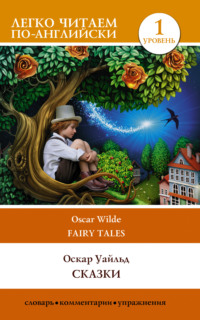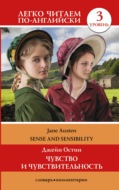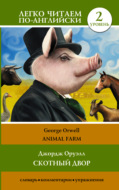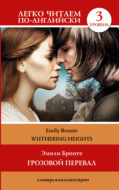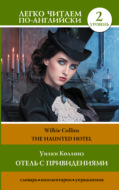Loe raamatut: «Сказки / Fairy Tales»
© Матвеев С. А., адаптация текста, комментарии, упражнения и словарь
© ООО «Издательство АСТ», 2022
The Star-Child
Once upon a time1 two poor Woodcutters went home through a great pine-forest. It was winter, and a night of bitter cold. The snow was upon the ground, and upon the branches of the trees. The frost snapped the little twigs on their sides, as they passed. The mountain river was motionless in air, because the Ice-King kissed her. So cold was it that even the animals and the birds did not know what to do.
‘Ugh!’ snarled the Wolf, as he limped through the brushwood with his tail between his legs, ‘this is really monstrous weather. Why doesn’t the Government look to it?2’
‘Weet! weet! weet!’ twittered the green Linnets, ‘the old Earth is dead and she has her white shroud on.’
‘The Earth will marry soon, and this is her bridal dress,’ whispered the Doves to each other. Their little pink feet were quite frozen, but they felt that it was their duty to speak romantically.
‘Nonsense!’ growled the Wolf. ‘I tell you that it is all the fault of the Government. If you don’t believe me I shall eat you.’
The Wolf had a very practical mind, and always had a good argument.
‘Well, as for me,’ said the Woodpecker, who was a philosopher, ‘I don’t care3 an atomic theory for explanations. If a thing is so, it is so. At present it is terribly cold.’
Terribly cold it certainly was. The little Squirrels, who lived inside the tall fir-tree, rubbed each other’s noses to get some warm. The Rabbits curled themselves up in their holes, and did not look out of doors. The only people who enjoyed it were the Owls. Their feathers were quite stiff with rime4, but they did not mind5. They rolled their large yellow eyes, and cried across the forest,
‘Tu-whit! Tu-whoo! Tu-whit! Tu-whoo! What delightful weather!’
The two Woodcutters went on. They blew lustily upon their fingers, and stamped with their huge boots upon the caked snow. Once they sank into a deep drift, and came out as white as millers. Once they slipped on the hard smooth ice where the marsh-water was frozen. Their faggots fell out of their bundles, and they picked them up and bound them together again. Once they lost their way, and they were very afraid. They knew that the Snow is cruel to those who sleep in the wood. But they retraced their steps, and went warily. At last they reached the outskirts of the forest. They saw, far down in the valley beneath them, the lights of the village in which they dwelt.
They were overjoyed at their deliverance. They laughed aloud, and they saw the Earth like a flower of silver, and the Moon like a flower of gold.
But then they became sad, because they remembered their poverty. One of them said to the other,
‘Why do we laugh? This life is for the rich, and not for us. Why did not we die of cold in the forest? Why did not some wild beast eat us?’
‘Truly,’ answered his companion, ‘the rich have everything, the others have nothing. There is injustice in the world, there is eternal sorrow in it.’
But as they bewailed their misery to each other this strange thing happened. A very bright and beautiful star fell from heaven. It slipped down the side of the sky, passed by the other stars, and fell into the wood – not very far from them.
‘Look! It is a good piece of gold for whoever finds it,’ they cried, and began to run. They wanted to get some gold.
One of them ran faster than his mate, and outstripped him. He ran through the willows, and lo! there was indeed a piece of gold on the white snow. So he hastened towards it, and placed his hands upon it. It was a golden cloak, it had stars on it. And he cried out to his comrade:
‘Look! I see a treasure from the sky!’
When his comrade came near, they sat down in the snow, and loosened the folds of the cloak to divide the pieces of gold. But, alas! no gold was in it, nor silver, nor, indeed, any treasure. Only a little child who was asleep.
And one of them said to the other:
‘This is the end to our hope. This child is completely useless for us. Let us leave it here6, and go away. We are poor men, and have children of our own.’
But his companion answered him:
‘No, but it is an evil thing to leave the child to perish here in the snow. I am as poor as you are, and have many mouths to feed. But I want to bring this child home with me. My wife will have care of it7.’
He took up the child tenderly, and wrapped the cloak around it. Then he went down the hill to the village.
‘What a fool!’ thought his comrade.
When they came to the village, his comrade said to him,
‘You have the child, therefore give me the cloak.’
But he answered him:
‘No, for the cloak is neither mine nor yours, but the child’s only.’
And he went to his own house and knocked.
When his wife opened the door and saw her husband, she put her arms round his neck and kissed him. Then she took from his back the bundle of faggots, and brushed the snow off his boots.
But he said to her,
‘I found something in the forest. Look! It is here, take care of it.’
‘What is it?’ his wife cried. ‘Show it to me, we are poor, we need many things.’
And he drew the cloak back, and showed her the child.
‘Oh God!’ she murmured, ‘have we not children of our own? Why do you bring changelings8 here? And who knows if it will not bring us bad fortune? And how shall we take care of it?’
She was wroth against him.
‘It is a Star-Child,’ he answered; and he told her the strange story.
But she mocked at him, and spoke angrily, and cried:
‘Our children are hungry. Why shall we feed someone’s child? Who will care for us? And who will give us food?’
‘God cares for the sparrows even, and feeds them,’ he answered.
‘Do not the sparrows die of hunger in the winter?’ she asked. ‘And is it not winter now?’
The man answered nothing, but did not come in.
A bitter wind from the forest came in through the open door. The woman trembled, and shivered, and said to him:
‘Will you close the door? A bitter wind comes into the house, and I am cold.’
‘It is always cold in a house where a heart is hard,’ he said.
And the woman answered him nothing, but crept closer to the fire.
Soon she turned round and looked at him, and her eyes were full of tears. And he came in swiftly, and placed the child in her arms. She kissed it, and laid it in a little bed – with the youngest of their own children.
In the morning, the Woodcutter took the curious cloak of gold and placed it in a great chest. His wife took a chain of amber9 that was round the child’s neck and put it in the chest also.
So the Star-Child lived with the children of the Woodcutter, and sat at the same board with them, and was their playmate. Every year he became more beautiful. All those who dwelt in the village were surprised, because the children of the Woodcutter were swarthy and black-haired, and the Star-Child was white and delicate as sawn ivory. And his curls were like the rings of the daffodil. His lips, also, were like the petals of a red flower, and his eyes were like violets by a river of pure water. And his body was like the narcissus of a field.
But this child grew proud, and cruel, and selfish. He despised the children of the Woodcutter, and the other children of the village. He said that they were of mean parentage, while he was noble. He sprang from a Star! He called himself their master and them his servants. He had no pity for the poor, or for the blind or maimed. He cast stones at them and drive them out. None came twice to that village to ask for alms.
Indeed, he was very beautiful, and mocked at the weakly and made jest of them10. He loved himself only. In summer, when the winds were still, he liked to lie by the well in the priest’s orchard and look down at the marvel of his own face.
The Woodcutter and his wife often chided him, and said:
‘We did not leave you in the forest when you needed pity. Why are you so cruel to all who need pity?’
The old priest taught him the love of living creatures, and said:
‘The fly is your brother. Do it no harm. The wild birds that roam through the forest have their freedom. Do not snare them for your pleasure. God made the worms and the moles, and each has its place. Who are you to bring pain into God’s world? Even the cattle of the field praise Him.’
But the Star-Child did not heed their words, He listened and frowned and went back to his companions, and led them. His companions followed him, because he was fair and clever. He danced, and piped, and made music. And wherever the Star-Child led them they followed. Whatever the Star-Child bade them do, that did they.
When he pierced with a sharp reed the dim eyes of the mole, they laughed. When he cast stones at the leper they laughed also. In all things he ruled them, and they became cruel as he was.
One day through the village a poor beggar-woman passed by. Her garments were torn and ragged. Her feet were sick, and she was very tired and weary. She sat her down under a chestnut-tree to rest.
But when the Star-Child saw her, he said to his companions,
‘See! A foul beggar-woman under that fair and green-leaved tree. Come, let us drive her hence, for she is ugly.’
So he came near and threw stones at her, and mocked her. She looked at him with terror in her eyes. She did move her gaze from him. And when the Woodcutter saw all this, he ran up and rebuked the Star-Child, and said to him:
‘Surely you are very cruel and don’t know mercy. What evil did this poor woman do to you?’
The Star-Child grew red with anger, and stamped his foot upon the ground, and said,
‘Who are you to question me what I do? I am not your son.’
‘You speak truly,’ answered the Woodcutter, ‘yet did I show you pity when I found you in the forest?’
When the woman heard these words she cried, and fell into a swoon. The Woodcutter carried her to his own house, and his wife took care of her. When the poor woman rose up from the swoon, they set meat and drink before her. But she did not eat nor drink. She said to the Woodcutter,
‘Didn’t you say that the child was from the forest? And was it not ten years from this day?’
And the Woodcutter answered,
‘Yes, it was in the forest that I found him. It was ten years ago.’
‘And what signs did you find with him?’ she cried. ‘Did he have a chain of amber upon his neck? Did he have a cloak of gold tissue with stars round him?’
‘Truly,’ answered the Woodcutter, ‘it was even as you say.’
And he took the cloak and the amber chain from the chest, and showed them to her. When she saw them she wept for joy, and said,
‘He is my little son whom I lost in the forest. Please send for him quickly, for in search of him I wander over the whole world.’
So the Woodcutter and his wife went out and called to the Star-Child, and said to him,
‘Go into the house, and you will find your mother. She is there.’
So he ran in, filled with wonder and great gladness. But when he saw her, he laughed scornfully and said,
‘But where is my mother? For I see none here but this vile beggar-woman.’
And the woman answered him,
‘I am your mother.’
‘You are mad to say so,’ cried the Star-Child angrily. ‘I am not your son, you are a beggar, and ugly, and in rags. Therefore get out, and let me never see your foul face!’
‘But you are indeed my little son, whom I bare in the forest,’ she cried. She fell on her knees, and held out her arms to him. ‘The robbers stole you from me, and left you to die,’ she murmured, ‘but I recognized you when I saw you. I also recognized the signs, the cloak of golden tissue and the amber chain. Therefore please come with me! Come with me, my son, I need your love.’
But the Star-Child did not move from his place. He shut the doors of his heart against her. The woman wept for pain.
At last he spoke to her, and his voice was hard and bitter.
‘If you are really my mother,’ he said, ‘stay away, and do not come here to bring me to shame. I thought I was the child of a Star, and not a beggar’s child, as you tell me that I am. Therefore get away, and let me never see you again!’
‘Alas! my son,’ she cried, ‘will you not kiss me before I go? I suffered much to find you.’
‘No,’ said the Star-Child, ‘you are very foul, I can’t look at you. I prefer to kiss the adder or the toad than you.’
So the woman rose up, and went away into the forest. She wept bitterly. When the Star-Child saw that she was away, he was glad, and ran back to his playmates to play with them.
But when they beheld him, they mocked him and said,
‘Oh, you are as foul as the toad, and as loathsome as the adder. Go away, because we don’t want to play with you!’
And they drove him out11 of the garden.
The Star-Child frowned and said to himself,
‘What is this that they say to me? I will go to the river and look into it. It will tell me of my beauty.’
So he went to the river and looked into it, and lo! His face was as the face of a toad, and his body was like an adder. And he fell down on the grass and wept, and said to himself,
‘Surely this is the result of my sin. I denied my mother, and drove her away. I was proud, and cruel to her. I will go and seek her through the whole world. I will ask her to forgive me!’
A little daughter of the Woodcutter came to him. She put her hand upon his shoulder and said,
‘You lost your beauty – it does not matter12. Stay with us, and I will not mock at you.’
And he said to her,
‘No, I was cruel to my mother, and this evil is a punishment. I must go and wander through the world till I find her. I hope she will give me her forgiveness.’
So he ran away into the forest and called out to his mother to come to him, but there was no answer. All day long he called to her, and, when the sun set he lay down to sleep on a bed of leaves. The birds and the animals fled from him. They remembered his cruelty. He was alone save for the toad and the adder that watched him.
In the morning he rose up, and plucked some bitter berries from the trees and ate them. After that he went through the wood and wept sorely. And he wanted to know if anybody saw his mother.
He said to the Mole,
‘You can go beneath the earth. Tell me, is my mother there?’
And the Mole answered,
‘You blinded my eyes. How can I know?’
He said to the Linnet,
‘You can fly over the tops of the tall trees. You can see the whole world. Tell me, can you see my mother?’
And the Linnet answered,
‘You hurt my wings for your pleasure. How can I fly?’
And to the little Squirrel who lived in the fir-tree, and was lonely, he said,
‘Where is my mother?’
And the Squirrel answered,
‘You killed my children. Do you want to kill her, too?’
And the Star-Child wept and bowed his head, and prayed forgiveness of God’s creatures. He went on through the forest, he looked for the beggar-woman. On the third day he came to the other side of the forest and went down into the plain13.
When he passed through the villages the children mocked him, and threw stones at him. The farmers did not let him sleep even in the byres, because he was very foul. The workers drove him away, and there was none who had pity on him. Nor could he hear anywhere of the beggar-woman who was his mother.
During three years he wandered over the world, and often saw beggars on the road. But he met his mother nowhere.
He wandered over the world, and in the world there was neither love nor kindness nor charity for him. It was such a world as he made for himself in the days of his great pride.
One evening he came to the gate of a city that stood by a river. He was weary and footsore and tried to enter. But the soldiers who stood on guard dropped their halberts14 across the entrance, and said roughly to him,
‘What do you want in the city?’
‘I look for my mother,’ he answered, ‘please let me enter in, she may be in this city.’
But the soldiers mocked at him. One of them wagged a black beard, and set down his shield and cried,
‘Truly, your mother will not be merry when she sees you, because you are uglier than the toad of the marsh, or the adder that crawls in the fen. Get away! Your mother does not dwell in this city.’
And another soldier, who held a yellow banner in his hand, said to him,
‘Who is your mother? Why are you not together with her?’
The Star-Child answered,
‘My mother is a beggar as I am. I treated her evilly. Please let me pass that she may give me her forgiveness, if she lives in this city.’
But the soldiers pricked him with their spears.
As he turned away, one whose armour was with gilt flowers, and on whose helmet couched a lion with wings, came up and asked the soldiers who it was. The soldiers said to him,
‘It is a beggar and the child of a beggar. Let him go away.’
‘No,’ he cried and laughed, ‘but we will sell the foul child for a slave and buy a bottle of sweet wine.’
An old and evil-visaged man15 who passed by, said,
‘I will buy him for that price.’
He paid the price and took the Star-Child by the hand and led him into the city.
After that they went through many streets and came to a little door in a wall that was covered with a pomegranate tree. The old man touched the door with a ring of graved jasper and it opened. They went down five steps of brass into a garden with black poppies and green clay jars. Then the old man took from his turban a scarf of figured silk, and bound with it the eyes of the Star-Child. Then he pushed him forward.
When the old man took the scarf off the Child’s eyes, the Star-Child found himself in a dungeon. The old man set before him some mouldy bread on a trencher and said,
‘Eat,’ and some brackish water in a cup and said, ‘Drink.’
Then the old man went out, locked the door behind him and fastened it with an iron chain.
The old man was indeed the magician of Libya and learned his art from one who dwelt in the tombs of the Nile. In the morning, he came in to the Star-Child and frowned at him, and said,
